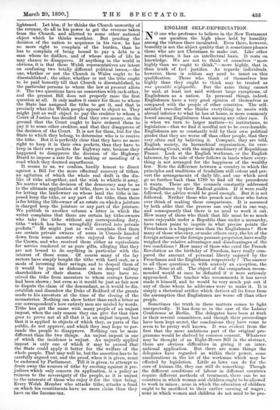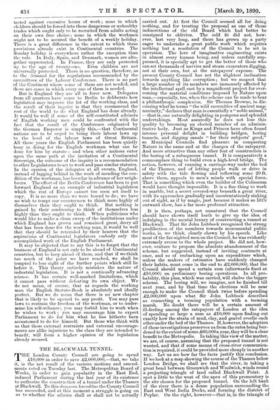ENGLISH SELF-DEPRECIATION.
IN0 one who professes to believe in the New Testament can question the high place held by humility among the virtues there inculcated. Even there, however, humility is not the abject quality that it sometimes pleases those who are not Christians to make out. Like other moral virtues, it has an intellectual basis. It rests on knowledge. We are not to think of ourselves " more highly than we ought to think,"—more highly, that is, than truth of fact justifies. As regards individuals, however, there is seldom any need to insist on this qualification. Those who think of themselves less highly than they ought to think may be treated as une quantite negligeable. But the same thing cannot be said, at least not said without large exceptions, of Englishmen as a nation. In personal things, indeed, Englishmen have a very good opinion of themselves as compared with the people of other countries. The self- satisfied traveller who thinks everything he meets with abroad inferior to what he has at home, is more commonly found among Englishmen than among any other race. It is when we turn to larger matters—to institutions, to legislation—that we find it needful not to be over-humble. Englishmen are so constantly told by their own political guides that they are worse off than other people, that they very often end by believing it. Compare, they are told, English society, its hierarchical organisation, its over- shadowing Court, with the simple machinery of Republican France. Look at the English workman, or the English labourer, by the side of their fellows in lands where every- thing is not arranged for the happiness of the wealthy few. Note the difference between a country in which the principles and traditions of feudalism still colour and per- vert the arrangements of daily life, and one which need go no further back than 1789 to find all the precedents it wants. These are the counsels constantly addressed to Englishmen by their Radical guides. If it were really followed, the advice would be good enough. But it is not followed. Neither those who preach nor those who listen ever think of making these comparisons. It is assumed by both alike that the process can only end in one way, and consequently that there is no need to work it out. How many of those who think that life must be so much more enjoyable under a Republic than under a monarchy, have taken pains to inquire in what precise points the Frenchman is a happier man than the Englishman ? How many of those who envy, or make others envy, the lot of the foreign artisan or the foreign peasant-proprietor, have really weighed the relative advantages and disadvantages of the two conditions ? How many of those who extol the French Revolution as the birthday of Freedom, have really com- pared the amount of personal liberty enjoyed by the Frenchman and the Englishman respectively ? The answer to all these questions is, with scarcely an exception, the same : None at all. The object of the comparison recom- mended would at once be defeated if it were seriously approached. The teacher who recommends it has never made it himself, and he would be very much put out if any of those whom he addresses were to make it. It is simply a rhetorical artifice which derives all its force from the assumption that Englishmen are worse off than other people.
Sometimes the truth in these matters comes to light unexpectedly. It has done so in the case of the Labour Conference at Berlin. The delegates have been at work in their several committees, and though their proceedings have been kept secret, the conclusions they have come to seem to be pretty well known. It was evident from the first that the more ambitious part of the original pro- gramme would be shelved by common consent. Whatever may be thought of an Eight-Hours Bill in the abstract, there are obvious difficulties in giving it an inter- national application. But there are some things the delegates have regarded as within their power, some ameliorations in the lot of the workman which may be effected by legislation. Little as laws can do for the cure of human ills, they can still do something. Though the different conditions of labour in different countries require different methods of treatment, there can be no countries in which women and children ought to be allowed to work in mines ; none in which the education of children ought to be sacrificed to their earlier earning of wages ; none in which women and children do not need to be pro- tested against excessive hours of work ; none in which children should be forced into those dangerous or unhealthy trades which ought only to be recruited from adults acting on their own free choice ; none in which the workmen ought not to be secured the benefit of a weekly holiday. There is a great difference in the extent to which these provisions already exist in Continental countries. The Sunday holiday is everywhere rather the exception than the rule. In Italy, Spain, and Denmark, women are alto- gether unprotected. In France, they are only protected up to the age of twenty-one. Even children are not universally protected. There is no question, therefore, as to the demand for the regulations recommended by the committees of the Labour Conference. There is no part of the Continent where some of them are not needed, and there are cases in which every one of them is needed. But in England they are all in force now. Delegates from all quarters have come to Berlin to deliberate how legislation may improve the lot of the working class, and the result of their inquiry is that they recommend the rest of the world to do what England has done already. It would be well if some of the self-constituted advisers of English working men could be confronted with the fact that the result of the Conference originated by the German Emperor is simply this,—that Continental nations are to be urged to bring their labour laws up to the level of the labour laws of Great Britain. All these years the English Parliament has been quietly busy in doing for the English workman what can be done for him by statute ; and when other nations enter upon the same path at the invitation of a Continental Sovereign, the outcome of the inquiry is a recommendation to other Legislatures to set to work and pass similar statutes. In the opinion of the delegates at all events, England, instead of lagging behind in the work of mending the con- dition of the workman, has been far in advance of her neigh- bours. The effect of the Berlin Conference has been to put forward England as an example of industrial legislation which the rest of Europe cannot too soon set itself to copy. It is no more than we were bound to do ; we have no wish to tempt our countrymen to think more highly of themselves than they ought to think. But nothing is gained by their continuing to think of themselves less highly than they ought to think. When politicians who would like to make a clean sweep of the institutions under which England has grown and remained great, decry all that has been done for the working man, it would be well that they should be reminded by their hearers that the aspirations of Continental legislators embody only the accomplished work of the English Parliament. It may be objected that to say this is to forget that the business of England is not only to be ahead of Continental countries, but to keep ahead of them, and that if we think too much of the point we have reached, we shall be tempted to lose sight of the further points which still lie before it. This theory entirely mistakes the nature of industrial legislation. It is not a continually advancing science. It has certain well-marked limitations, which it cannot pass without defeating its own object. We do not mean, of course, that as regards the working man the English Statute-Book is absolutely and ideally perfect. But we do mean that there is no new chapter that is likely to be opened to any profit. You may pass laws to restrain the freedom of the workman, or to under- mine his self-reliance ; you may forbid him to work when he wishes to work ; you may encourage him to expect Parliament to do for him what he has hitherto been accustomed to do for himself. But those who think with us that these external restraints and external encourage- ments are alike injurious to the class they are intended to benefit, will form a higher opinion of the legislation already secured.







































 Previous page
Previous page